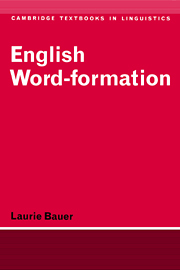Book contents
- Frontmatter
- Contents
- Dedication
- Preface
- 1 Introduction
- 2 Some basic concepts
- 3 Lexicalization
- 4 Productivity
- 5 Phonological issues in word-formation
- 6 Syntactic and semantic issues in word-formation
- 7 An outline of English word-formation
- 8 Theory and practice
- 9 Conclusion
- Bibliography and citation index
- Index
- Frontmatter
- Contents
- Dedication
- Preface
- 1 Introduction
- 2 Some basic concepts
- 3 Lexicalization
- 4 Productivity
- 5 Phonological issues in word-formation
- 6 Syntactic and semantic issues in word-formation
- 7 An outline of English word-formation
- 8 Theory and practice
- 9 Conclusion
- Bibliography and citation index
- Index
Summary
Irregularity is a manifestation of an important regularity of language: change.
(Hudson, 1974: 224)Patterns of synchronic alternations, however clearly discernible they may be, are merely reflections of past historical developments.
(Hsieh, 1976: 15)Reconstruction of the history of a vocabulary-item
When a word first appears in a language, whether as a loan or caique, or as a nonce formation (i.e. a new complex word coined on the spur of the moment), it appears that speakers are aware of its newness, that is they are aware that they are exploiting the productivity of the language system (see in greater detail below, chapter 4). Thus, in modern journalistic language the word is often put in inverted commas, a phrase is added such as “what has been called”, “as it is termed” and so on, or a complete gloss is provided. The large amount of written evidence for this awareness of novelty is a fairly recent phenomenon, since it is only in the twentieth century that vast numbers of dailies and periodicals have become commonplace, but it may be assumed that the awareness of innovation is not as recent as that, and that earlier generations put intonational “inverted commas” round the term, and provided oral glosses in the same way. In literary language, where new forms are often produced specifically to provide effect, such marking does not take place, and the form is most frequently left to speak for itself; but it should be remembered that, statistically speaking, literary language is the exception rather than the rule in linguistic behaviour.
- Type
- Chapter
- Information
- English Word-Formation , pp. 42 - 61Publisher: Cambridge University PressPrint publication year: 1983

